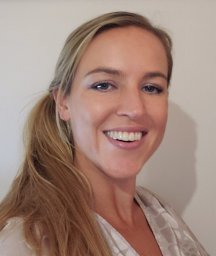
Keywords
Biography
Dr Claire Burley is interested in healthy ageing, measures of brain health (e.g., MRI and Doppler imaging, neuropsychiatric, cognitive and quality of life), changed behaviours, psychological symptoms, dementia risk factors, and improving care for people living with dementia using person-centred, non-pharmacological approaches. Dr Burley has two research/ teaching roles at the Faculty of Medicine and Health, UNSW Sydney, both involving dementia...view more
Dr Claire Burley is interested in healthy ageing, measures of brain health (e.g., MRI and Doppler imaging, neuropsychiatric, cognitive and quality of life), changed behaviours, psychological symptoms, dementia risk factors, and improving care for people living with dementia using person-centred, non-pharmacological approaches. Dr Burley has two research/ teaching roles at the Faculty of Medicine and Health, UNSW Sydney, both involving dementia and brain health. One is based at the Centre for Healthy Brain Ageing (CHeBA), School of Clinical Medicine and the other is based at the UNSW Medicine & Health Lifestyle Clinic, School of Health Sciences.
Centre for Healthy Brain Ageing (CHeBA), School of Clinical Medicine:
Dr Burley's CHeBA project is funded by the NHMRC and focused on improving care for people living with dementia in the hospital setting using nonpharmacological and evidence-based approaches such as person-centred care (PCC). The study involves educating nursing, medical and allied health staff in person-centred care which has been shown to improve health outcomes for people living with dementia, reduce neuropsychiatric symptoms, and lead to higher levels of staff satisfaction. Their team have shown that these approaches are effective in a hospital setting in a pilot study and implementation study. A PhD student has developed and implemented the online education component of the PCC program.
UNSW Medicine & Health Lifestyle Clinic, School of Health Sciences:
Dr Burley's projects at the UNSW Lifestyle Clinic focus on improving physical and brain health using physical activity approaches provided by Accredited Exercise Physiologists. These projects include optimising exercise strategies for hypertension, diabetes, osteoporosis and osteoarthritis. These strategies aim to reduce pain, improve quality of life and reduce risk for falls and developing dementia. Two PhD students developing this work and are investigating optimal exercise and dietary strategies for people living with osteoarthritis and osteoporosis, both are which are associated with increased dementia risk.
My Grants
2023:
CIA, Neuroscience, Mental Health & Addictions Theme, $40,000. Healthy Body & Mind Program for people living with cognitive decline and osteoarthritis.
2022:
CI, Dementia Australia Research Foundation (DARF) Project Grant, $75,000. Towards better mental health of people living with dementia in Residential Aged Care: Co-design of a performance measurement tool to aid organisational governance.
2021:
CI, NHMRC DCRC World Class Research Grant, $600,000. Improving health outcomes, well-being and care for people living with dementia in a hospital setting.
2018:
Named researcher, Birmingham-Nottingham Strategic Collaboration Fund, £38,000. Contrasting measures of cerebral haemodynamics between MRI (ASL, BOLD & PCA) and Doppler ultrasound (TCD, Duplex Doppler).
2016:
CI, Cambridge Cognition Research Grant - Doctoral Researcher. A multimodal investigation of brain health: cerebral blood flow, cognitive performance and quality of life.
My Qualifications
PhD A Multimodal Investigation of Brain Health: Cerebral Blood Flow, Cognitive Performance and Quality of Life; University of Birmingham, UK
MSc Clinical Neuroscience; University College London, UK
BSc (Hons) Psychology (with industrial placement, Oxford Health NHS Foundation Trust); Loughborough University, UK
My Awards
2023:
UNSW School of Clinical Medicine Travel Award ($600)
2022:
Centre for Healthy Brain Ageing (CHeBA) Publication Award
2021:
Alzheimer's Association International Conference (AAIC) Travel Fellowship (Registration & accommodation)
2020:
Alzheimer’s Disease International (ADI) Early Career Researcher Bursary (Invitation to present, registration)
2018:
Birmingham College LES Travel Award (£500)
Physiological Society Travel Award (£500)
2017:
Birmingham College LES Travel Award (£600)
Physiological Society Travel Award (£500)
2016:
Guarantors of Brain Travel Grant (£1,000)
Physiological Society Travel Award (£500)
2015:
U21 Research Scholarship, UBC, Canada (£1,500)
Birmingham Travel Scholarship (£1,000)
Birmingham College LES Travel Award (£1,000)
Physiological Society Travel Award (£500)
2014:
3-year PhD Studentship, University of Birmingham